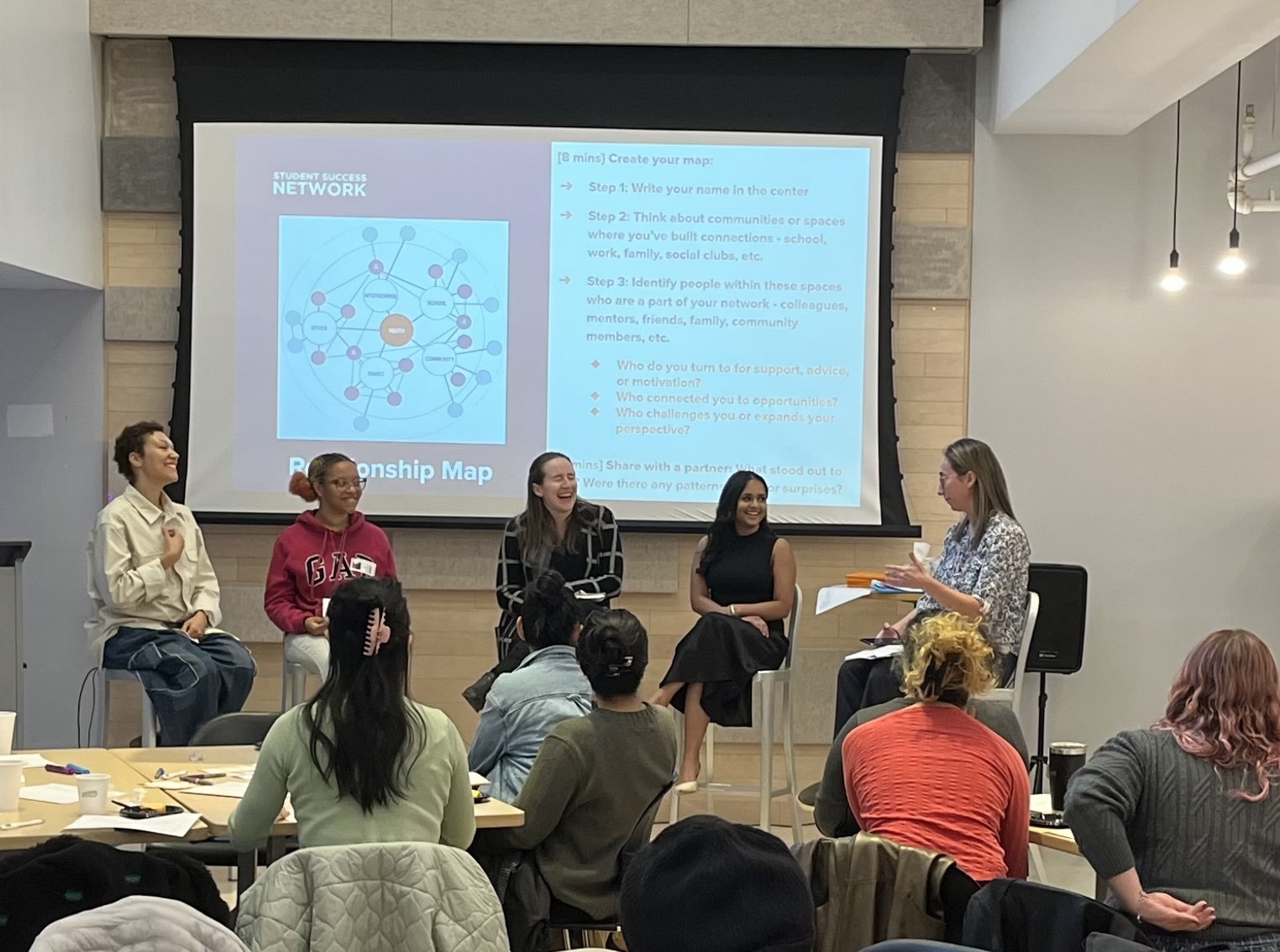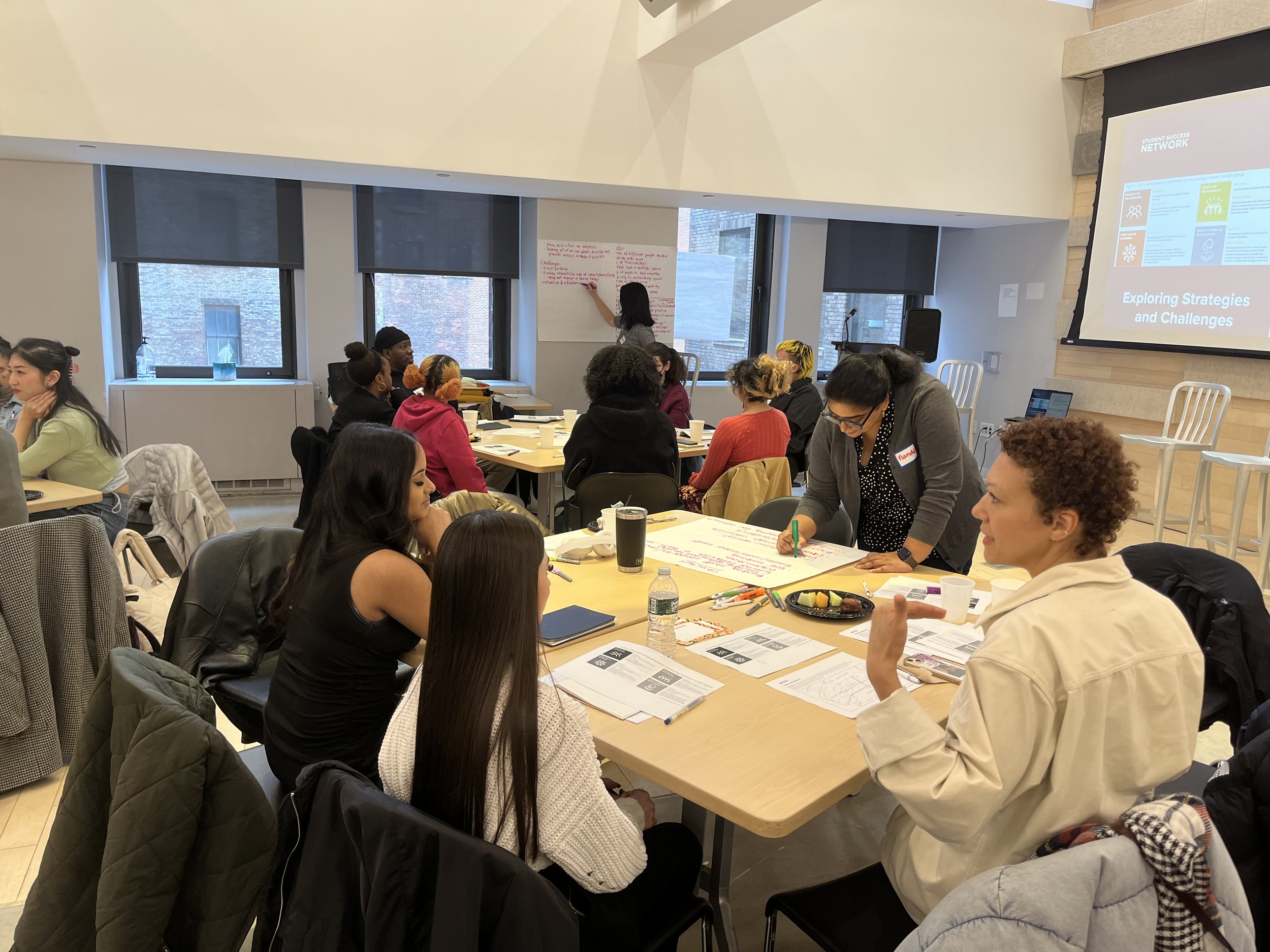Community Insights: Building Student Networks
At Student Success Network (SSN), we’re committed to exploring what skills and experiences young people need to be successful. One key priority we’ve heard from our members is the importance of building strong networks – students’ access to, and ability to mobilize, relationships that help them further their potential and goals.
Picture this: You’ve just graduated. And despite doing everything “right” – finishing school, earning good grades, balancing responsibilities – you’re struggling to land a job or even figure out what comes next. For many young people, this is a reality. A young person’s network plays a vital role in college and career access and success and can make all the difference. A diverse web of relationships can improve well-being, prepare young people with necessary skills and knowledge, boost academic outcomes, and expand professional opportunities. And networks are essential for obtaining early work experiences - 87% of employers say they hire interns through an informal channel, such as a professional connection, direct outreach from a student, or a recommendation.
But young people tell us that building their networks, both personally and professionally, is challenging. For many first-generation, first-time job seekers, connections with professionals that can help open doors are elusive. And in focus groups with students age 18-22, the top challenge raised was building community to help them navigate the major shifts into adulthood.
Recently, we hosted Community Insights: Building Student Networks, bringing together experts, young leaders, and practitioners to dive deeper into these challenges. We heard insights from Eileen Baptistin Level, Director of Teen and Young Adult Programs (YAP), and Seani Edwards, YAP Participant at The Opportunity Hub, as well as Maggie Raible, Head of Impact and Experience, and Sadia Begum, Basta Fellowship Alum at Project Basta.
Here’s what we learned about the challenge of network building from our amazing panelists and Network members:
Building Trusting Relationships
Young people noted that networking feels intimidating, can be anxiety-inducing, and is often perceived as transactional. Redefining networking as relationship-building is essential. We discussed the importance of programs prioritizing personal support and trust-building as foundational steps. As Eileen emphasized:
"It’s not always getting them a job or getting them set up with a resume. You have to start with getting them comfortable, getting them to trust the person that's in this room, so they can be their authentic self. Then, we can actually start to dig in and understand: what are your needs, what are your passions? … When trust is built, now it's like, I see you. They won't take the resources if they don't trust you, and if you don't understand their history and why they feel like the system is built against them."
Fostering Confidence and Mobilization Skills
Many young people understand that networking is important but often lack the confidence and mobilization skills to activate their network and take advantage of opportunities. Structured activities, such as workplace visits and reaching out to people on Linkedin, provide opportunities for young people to practice networking and build confidence. Additionally, myths of meritocracy can deter young people from seeking help. We must normalize networking as a shared, reciprocal process. Seani spoke about the anxiety young people may face in navigating life after high school:
“A lot of young people my age or younger … may not know who to turn to, what to ask for, where to go, and they may feel lost. After I graduated from high school, it was just like, ‘Okay, so now what?’ I feel like schools really prepared you for college only. When you're 21 or 18, you're an adult, but you're not really an adult… But with connections, [young] people can get the support they need.”
Establishing Diverse Networks
Access to senior professionals in networks increases tangible benefits for young people, such as internships and job referrals. However, close, personal connections are just as valuable. Diverse networks foster broader exposure to opportunities and perspectives, which is essential for first-generation and first-time job seekers. Sadia shared her experience:
“Both my parents are immigrants. So, growing up, the only careers I knew about were lawyer, engineering, and doctor. That was kind of it.”
Maggie added:
“Young people in our program who have access to more senior professionals in their network are getting more tangible resources from their networking efforts, from the work that they put into it, than those who have less who have more personal connections or more sort of peer connections, and so that's something that we…really take into our work. Again, be very clear: all of the nodes of a young person's network matter, and specifically for getting a very first job, senior professional connections play a really important role.”
See here for Basta's research on the importance of connections to senior professionals.
Leveraging Student Interests
The pandemic established isolation as a norm for many young people. Rebuilding social connections requires intentional, engaging, and fun experiences. Programs that integrate experiences based on shared interests help “break down walls” and build trust over time.
Maintaining Networks
Young people need tools to sustain and organize their networks. Tools like network maps and periodic check-in templates can help them effectively manage relationships over time. Sadia reflected on a key moment during the Basta fellowship:
“I remember this one networking event at the beginning [of the Basta fellowship], and we were all in groups with senior professionals. And this CEO of a boutique healthcare consulting company, a very small company… I followed up with him after ….And just by doing that coffee chat, he was like, 'Oh, I'm actually looking for some interns, you know, if you're interested, let me know.' And from that, he gave me an internship opportunity. I don't even think he looked at my resume. So that was the first moment where I was like, 'Okay, this actually works.' And obviously, not everyone you're going to speak to will give you a job right then and there, but things like that do happen if you foster that relationship and connection. So I'm glad I had that Aha moment in the beginning because I was like this isn't just something that people are just telling us to do. It works. It paid off."
Identifying Success
To know whether efforts to build networks are working, we discussed key indicators such as students showing up for opportunities, seeing people in their network reach out to them, and seeing a connection between networking activities and landing that first job. Project Basta uses their Seekr tool to help see where students are and figure out what supports they need.
Check out this this research from the Christensen Institute on measuring the strength of networks, along with a playbook offering strategies to build shared social capital goals, sustain connections, and create networking opportunities aligned with students’ interests.
What’s Next: Improvement Lab
In January 2025, we will launch Improvement Lab: Building Student Networks, a cohort bringing together community-based organizations focused on designing, testing, and codifying practices that build students’ personal and professional networks. The lab aims to improve students’ access to, and ability to mobilize, relationships that help them further their potential and their goals.
Stay tuned for updates, and if you’re interested in joining, reach out to marieme@ssn-nyc.org - we’d love to hear from you!


